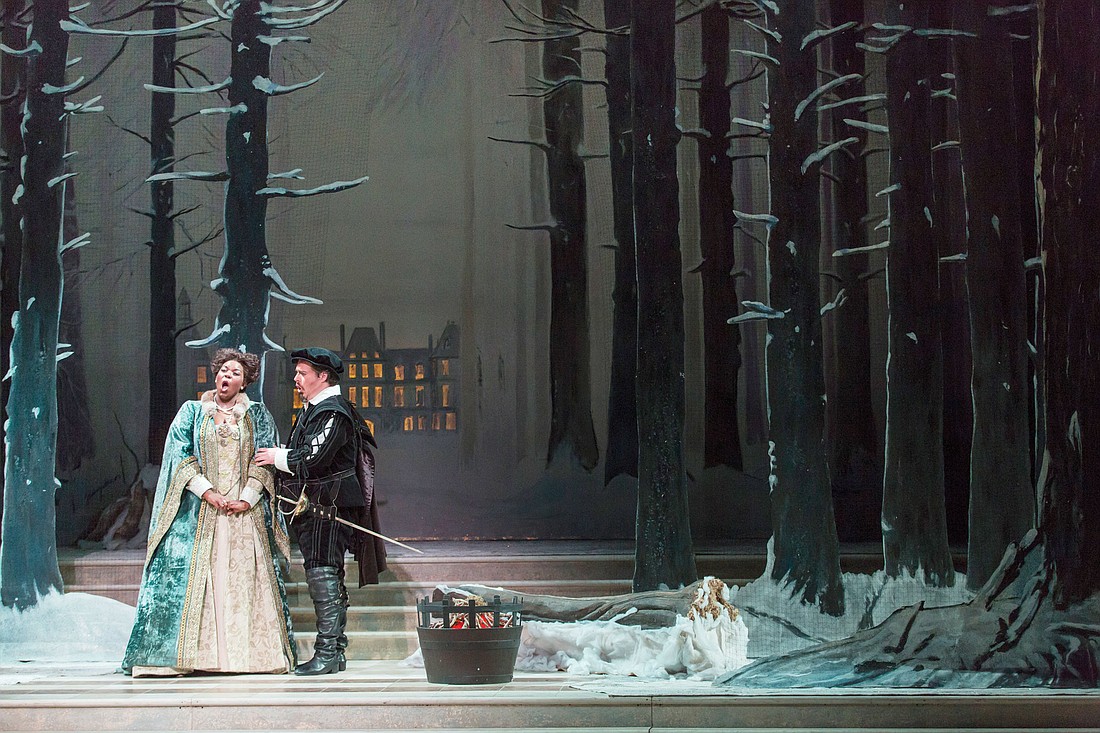- April 25, 2024
-
-
Loading

Loading

What’s the recipe for grand opera? Take a soupcon of historic fact and mix well with large dollops of passion and heaping portions of great music. Then add fine singers, instrumentalists, appropriate costumes, scenery, a stage director with a vision and a conductor with the grit of a field marshal and, voila: “Don Carlos,” in just four hours and 30 minutes, two intermissions and five acts of glory. Sarasota Opera, under the direction of Victor DeRenzi, has been making its way through the entire Verdi catalogue, including the composer’s three versions of “Don Carlos.”
On Saturday, Sarasota Opera opened its production of the five-act French version, which gives us the opening act, omitted in the other editions, that gives the rest of the opera a raison d’etre. Finally, we’re able to see for ourselves the love-at-first-sight connection made between Don Carlos, infante of Spain, and Elisabeth de Valois, two young people (history tells us he was 15 and she just 13), and why they’re so ecstatically happy that their planned marriage is one they would have chosen.
We also see that Carlos’ father, Philippe II, king of Spain, who arranged the marriage, has — for political reasons — changed his mind and decided it’s in everyone’s best interests if he marries Elisabeth, himself. That’s the back story we only hear about but never witness in the other versions. And, believe me, if you’re already feeling confused, that opening act helps mightily in the next several hours as we wade through political struggles, religious wars, the pageant of an auto-da-fé with its street fair atmosphere surrounding prisoners about to be executed, inexplicable ghostly apparitions, friendships that hold bonds so deep they cut through life, deceptions, jealousies and a horrific display of the terrors of the Inquisition.
But it’s the music that makes this grand opera truly grand. Try as she may, Stage Director Stephanie Sundine couldn’t do much beyond what Verdi gave us, so most of the staging is static because the composer filled this work with a multitude of expository arias, duets and other exquisite small ensembles that allow us to see into the thoughts of the characters without much action. To have much movement on stage would be counter to the essence of Verdi’s concept of this opera. So, it’s best to sit back, appreciate the beautiful scenery by David Gordon, 16th-century costumes by Howard Tsvi Kaplan, lighting effects that bring it all together by Ken Yunker, and let the sound of music pour into your soul.
And pour it does. Michelle Johnson, as Elisabeth, brings a warm, rich, beautiful Verdian soprano that always seems to have more to give. On opening night she was careful not to over-sing and, as a result, her tone was always sumptuous and large with floating high notes reminiscent of a young Leontyne Price. Mary Phillips, the Princess Eboli who loves Carlos but is not only rejected by him but also a very dangerous woman scorned, sang and acted her role with great passion and understanding. Her voice has grown extraordinarily over the years since we first heard her in recital in New York City and, while she hasn’t lost her wonderful musicality, she has taken on a wider vibrato, darker sound and tendency (on this occasion, anyway), to over-sing. It’s not necessary. The voice is there, and she doesn’t need to push it.
Jonathan Burton, the Don Carlos, displayed a brilliant, clarion tenor that reverberated through the house and gave a passion to his role that grew vocally and emotionally as the opera went on. In fact, Burton and Johnson were able to imbue their characters with a humanity that gave us insights into their growth from carefree lovers to honorable, caring friends — a bow to Sundine, who always looks into the characters in her stagings.
Kevin Short was an incisive, frighteningly cold Philippe, quite capable of killing his own son if he thought God would approve. His raw, rugged bass-baritone is a perfect match for his character, as is Marco Nistico’s brash baritone and no-holds-barred sound as Rodrigue, the friend-through-thick-and-thin who eventually gives his life for his friend.
Young Bok Kim made a terrifying Grand Inquisitor, showing an upper range to his stolid bass that we hadn’t heard before. And Tyler Putnam, a studio artist, showed great vocal prowess as a Monk.
Special mention must be made of the magnificent chorus members. Their sound overcame the oratorio-like stance they maintained on stage, pouring out Verdi’s music like a group double their size. And DeRenzi brought out the best in his orchestra. Best of all, no matter how much solid support DeRenzi gave the singers, he never allowed the powerful orchestra to cover them.
“Don Carlos” is a long song but, historically and musically, it’s well worth the sit.